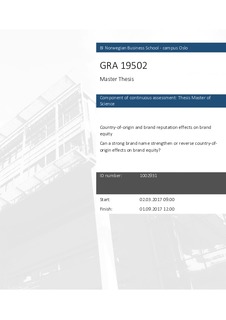Country-of-origin and brand reputation effects on brand equity. Can a strong brand name strengthen or reverse country-of-origin effects on brand equity?
Master thesis
Permanent lenke
http://hdl.handle.net/11250/2478322Utgivelsesdato
2017Metadata
Vis full innførselSamlinger
- Master of Science [1621]
Sammendrag
The concept of country-of-origin has been extensively studied with the apparition
of multinational companies separating and outsourcing their operations worldwide.
It has been established that country-of-origin has an impact on brand equity
mediated by four dimensions, namely brand awareness, brand associations,
perceived quality and brand loyalty. The purpose of this study is to examine the
effect of brand name over the relationship between country-of-origin and brand
equity dimensions. In particular, this paper intends to determine if it is possible to
counteract for a negative country-of-origin effect or strengthen a positive countryof-
origin effect by using another cue which is the brand name.
A conceptual framework is considered in which brand’s country-of-origin is
postulated to influence the four dimensions of consumer-based brand equity, which
is composed of brand awareness, brand associations, perceived quality, and brand
loyalty. Brand name acts as a moderator over this relationship.
Three versions of a survey were distributed among students from two business
school, EDHEC in France and BI in Oslo, using respectively Russia, Italy and
Switzerland as country-of-origin. Each survey evaluates the country-of-origin
effect on customer-based brand equity of premium chocolate before and after brand
name Lindt was revealed. The respondents first evaluate their brand associations,
perceived quality and brand loyalty when the only cue available is country-oforigin,
before evaluating again these three dimensions when brand name has been
revealed.
Findings indicate that evaluation of brand associations, perceived quality and brand
loyalty significantly increase after brand name was revealed when the originally
country-of-origin effect was negative. Therefore results show that it is possible to
counteract for a negative country-of-origin effect by using brand name cue.
However, evaluation of brand associations, perceived quality and brand loyalty
don’t significantly increase after brand name was revealed when the originally
country-of-origin effect was positive. Therefore brand name cue don’t significantly
strengthen a positive country-of-origin effect
Beskrivelse
Masteroppgave(MSc) in Master of Science in Business, Marketing - Handelshøyskolen BI, 2017
